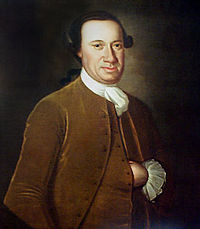 Question for your table:
Question for your table:Why so much to-do about the intersection of Channuka and Thanksgiving today?
One email going around claims that "it has never happened before...and it will never happen again."
Others have claimed that there is no connection between Channuka and Thanksgiving.
In fact, they're both wrong.
As always, we will try to dispel myths and to tell you the full truth.
First, Thanksgiving wasn't always in November.
The first official American Thanksgiving was celebrated in December.
It was proclaimed by President Henry Laurens as his first official act as President of the Continental Congress of the United States of America.
George Washington was the first president under the Constitution, and he too issued a Thanksgiving Proclamation, but he wasn't the first (unlike this Wikipedia article).
Washington began his first term in 1789. Who do you think ran the country before that?
When the United States of America was born on July 4, 1776, John Hancock was at the helm. Then Laurens began his term on November 1, 1777.
He was a veteran, a farmer and a wealthy slave trader. He was also a free-thinking .
His first act as President was to declare a national Day of Thanksgiving on December 18, 1777.
According to the Proclamation, Thanksgiving should be a solemn day: "Servile labor and such recreations (although at other times innocent) may be unbecoming the purpose of this appointment [and should] be omitted on so solemn an occasion.”
(Presidents like to issue proclamations, by the way. Back then, in times of war, they even declared days of "humiliation, fasting and prayer".)
Laurens was succeed by John Jay, Samuel Huntington, Thomas McKean and finally Maryland's own John Hanson.
 Hanson proclaimed that December 13, 1781 should be a national Day of Thanksgiving.
Hanson proclaimed that December 13, 1781 should be a national Day of Thanksgiving.Guess what, that was the 2nd night of Channuka.
Happened again in the 1800s.
And to those who say it won't happen again for 70,000 years?
That depends - will Thanksgiving always be on the 4th Thursday in November? I doubt it.
But there is a much more interesting connection between Channuka and Thanksgiving than merely the date.
On Channuka, there is a custom of saying Hallel - the song of praise, which emphasizes the Hebrew word HODU.
To understand this deeply, try to imagine you are the first European to visit America.
Of course, you think you're in India.
It's an amazing New World! Strange people, strange foliage, strange animals.
And you see this gobbly chicken-like bird.
What do you call it?
Remember, you think you're in India, so you naturally call it "Indian chicken."
Are you with me so far?
So French explorers dubbed this new bird poulet d'Inde (Indian chicken) later shortened to dinde (pronounced "dand").
English settlers called the bird turkey because they thought it looked like another type of fowl that was imported from Turkey.
Jewish explorers sided with the French and called it tarnegol hodu which means "hindu chicken" and was later shortened it to simply hodu.
What's interesting for us is that the Hebrew word HODU is prominent in Hallel (mentioned above) because it also happens to mean "give thanks."
So from a Jewish perspective, you could say it's very appropriate to eat hodu on "hodu"-day.
But does that make Thanksgiving Jewish?
Look up the word "Jewish".
It means from the tribe of Judah.
Look up the word Judah.
It means, you guessed it: "thankful".
Therefore, being "Jewish" means cultivating a thanksgiving mindset every single day.
(I can hear it already - "Gee honey, I'm watching so much football because the rabbi told me to....)
Wait a second (I know you're thinking this)... Did he say "Jewish explorers"??
He did.
In fact - and this is a juicy one for your table - when Columbus famously came to the New World, who among his crew was the very first to spot land? Obviously, it must have been the man working in the upper mast on the front ship, right? And we know who this was: Roderigo De Triana, a Jewish sailor.
So for your table: How Jewish is Thanksgiving?
One last thought:
Jews on this side of the pond should consider ourselves lucky to live in a country that has a national day of Thanksgiving.
Think about it.
I will just leave you with one question for your table and my own answer.
If Channuka and Thanksgiving are both about thanksgiving, what's the difference?
It might be interesting to pose that to the table before reading them the rabbi's answer.
The rabbi says:
Thanksgiving has traditionally - since the Pilgrims - been about gratitude for our material blessings.
Channuka has always been about gratitude for our spiritual blessings, and our membership in a Tribe that takes a lickin' and keeps on tickin'. Then and now.
Happy Hannuka
Happy Thanksgiving
Shabbat Shalom
PS - Audio class on cultivating gratitude by the inimitable R. Rietti
PPS - Some of the above is quoted from the Amazing Jewish Fact-a-Day Calendar for iPhone, iPad, Android, Kindle etc. Isn't it about time you forwarded a nugget like this to all your friends?
iPhone/iPad app
Android (Google) app
Android/Kindle (Amazon) version
 This week: a question for your table and an anti-question.
This week: a question for your table and an anti-question.

 Here's a true story for your table tonight, followed by an inescapable question.
Here's a true story for your table tonight, followed by an inescapable question.

